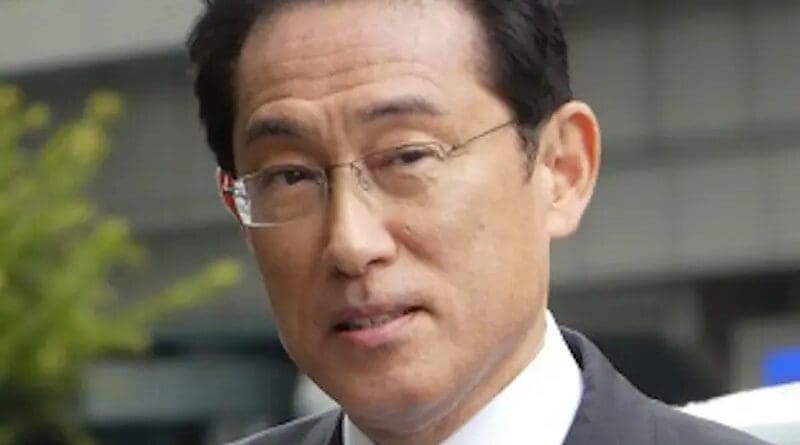Japan: Is Kishida A Dove Or A Hawk? – Analysis
By Kazuhiko Togo*
Shortly after his victory in the contest for the position of Liberal Democratic Party (LDP) President, and being sworn in as Japan’s new prime minister, Fumio Kishida dissolved the lower house and called a national election for 31 October. If the LDP retains sufficient power in this election and the July 2022 upper house election, Kishida could lead Japan for at least several years. An important question then for Japan’s future is whether Kishida will remain a dove or follow former prime minister Shinzo Abe’s more hawkish line.
The chief strategist who enabled Kishida’s victory was Shinzo Abe. By ensuring Kishida’s victory, Abe remained a powerful figure in the LDP. Kishida’s faction, the Kochikai, is traditionally dovish, while Abe’s faction, the Seiwakai, is known for being hawkish.
Kishida’s basic foreign policy has so far been a continuation of his predecessors, Shinzo Abe and Yoshihide Suga. In his parliamentary policy speech on 8 October, Kishida highlighted ‘freedom, democracy, human rights, and rule of law’. He emphasised the importance of the US–Japan alliance and the Quadrilateral Security Dialogue (Quad) — which includes Japan together with the United States, Australia and India — as well as Free and Open Indo-Pacific cooperation. Before dissolving the lower house, Kishida had telephone talks with the three other Quad leaders, as well as Russian President Vladimir Putin and Chinese President Xi Jinping, which gives us an indication of his foreign policy priorities.
Kishida highlighted the North Korean threat, including the issue of the abduction of Japanese citizens, nuclear proliferation, missile development and the need to normalise the bilateral relationship. At the end of the foreign policy section of his speech, Kishida also mentioned China, Russia and South Korea. His tone towards South Korea was chilly, towards Russia banal, and towards China a mix of assertive and constructive.
Should Kishida gain a stable domestic power base, then whether he takes a dovish or a hawkish line will hinge on four main issues.
The first is Japan’s future military capability of attacking enemy bases. As early as March 2021, Kishida reportedly had talks with key members of his own faction and hinted at his thinking that Japan should equip itself with the ability to strike enemy bases, a major departure from his faction’s traditional dovishness. Kishida reiterated on Twitter that ‘direct attack against an enemy’s missile launch capability is necessary’.
In September 2021, just before his retirement, Abe said in his farewell message that ‘the enemy base strike capability issue must be debated with an appropriate conclusion by the end of the year’. Though Suga did not follow through with this, Kishida has already shown his willingness. The LDP’s election manifesto included a commitment ‘to acquire new deterrence capabilities, including the ability to shoot down ballistic missiles inside the territory of an opponent country’.
The second issue is the practical handling of China. On each concrete issue that requires resolution, there is bound to be high-level diplomatic skill. Enemy base strike capabilities are considered primarily against North Korea, but given the geographical proximity, this new policy has to be implemented without putting Japan’s relations with China in jeopardy. Taiwan is also a sensitive issue for Japan, which has a critical interest in finding a peaceful solution while ensuring minimal satisfaction of the people across the strait.
This does not contradict Abe’s position — Abe’s great success during his tenure was to have achieved gradual improvement of relations with China while consolidating security ties with the United States. Kishida’s tone in his parliamentary speech and his first telephone talk with Xi Jinping was not a bad starting point.
The third issue is policy towards Russia. This may be the easiest meeting point between Kishida and Abe. Kishida has much to learn from Abe on how to strengthen the Russian relationship, which Abe put a great deal of effort into during his tenure. Improving relations with Russia would be a worthwhile achievement for a dovish Prime Minister. The wording of his parliamentary speech could have been better, but his telephone talk with Putin bodes well.
The last issue is South Korea. Kishida cannot be happy with South Korean president Moon Jae-in’s dismantling in 2018 of the Reconciliation and Healing Foundation on which Kishida had worked so hard to establish when he was foreign minister in 2015. By making a phone call with Moon only on 15 October after he dissolved the lower house and with the chilly wording of his parliamentary speech, Kishida has already shown his tough and principled attitude. But to be a successful dove Prime Minister, it is essential that Kishida finds a way to build trust and identify areas where the two countries’ national interests converge.
To become a great dovish Prime Minister, Kishida should take on this course once his power basis is stabilised, even if this causes some tensions with hawks within the LDP.
*About the author: Kazuhiko Togo is Visiting Professor at the Global Centre for Asian and Regional Research, University of Shizuoka. He was formerly Director General of the Treaties Bureau at the Ministry of Foreign Affairs, Japan.
Source: This article was published by East Asia Forum

